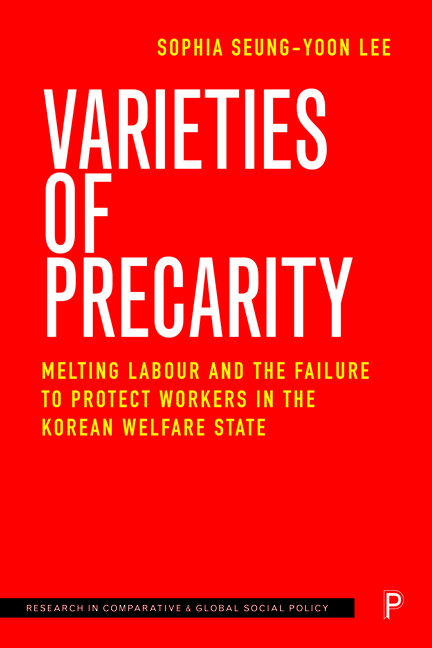 Varieties of Precarity
Varieties of Precarity Book contents
- Frontmatter
- Contents
- Series editors’ preface
- List of figures and tables
- Acknowledgements
- 1 Introduction: Melting labour and institutional inconsistency
- 2 Social protection policies and the South Korean labour market in comparative perspective
- 3 When insiders are kicked out: layoffs of regular workers in manufacturing
- 4 Same boat, different destiny: subcontracted workers in the Korean shipbuilding industry
- 5 Young and old outsourced female workers in call centres and cleaning services
- 6 Are freelancers really free? The Korean freelance labour market and the precarity of young freelancers
- 7 The digital precariat: various Korean platform workers and the new work logic
- 8 Conclusion: Towards universal institutional protection for precarious workers in the era of melting labour
- Notes
- References
- Index
6 - Are freelancers really free? The Korean freelance labour market and the precarity of young freelancers
Published online by Cambridge University Press: 03 April 2024
- Frontmatter
- Contents
- Series editors’ preface
- List of figures and tables
- Acknowledgements
- 1 Introduction: Melting labour and institutional inconsistency
- 2 Social protection policies and the South Korean labour market in comparative perspective
- 3 When insiders are kicked out: layoffs of regular workers in manufacturing
- 4 Same boat, different destiny: subcontracted workers in the Korean shipbuilding industry
- 5 Young and old outsourced female workers in call centres and cleaning services
- 6 Are freelancers really free? The Korean freelance labour market and the precarity of young freelancers
- 7 The digital precariat: various Korean platform workers and the new work logic
- 8 Conclusion: Towards universal institutional protection for precarious workers in the era of melting labour
- Notes
- References
- Index
Summary
‘If I tell my client that I caught a cold and need to take a break, I get no more work. When I am well again and tell the client that I can resume my work next month, the client may not need me because another freelancer has already replaced me. I live with this kind of anxiety. I think I shouldn’t get sick, and I shouldn’t take time off.’ (Education freelancer, female, age 29)
The expansion of freelancing
The rise of freelancing has become a global trend, including in South Korea, where there is growing interest in this type of work arrangement. However, the term ‘freelancer’ is not clearly defined and is used interchangeably with other terms, such as independent workers, free agents, one-person entrepreneurs and portfolio workers. This lack of clarity has resulted in the notion of freelancers not yet reaching social and legal consensus. Despite the lack of official statistics, studies have identified the increasing demand for and importance of freelancers in society, particularly with the changes in entrepreneurial structures and technological development. This chapter aims to examine the characteristics of freelance work, the insecurity experienced by freelancers, and their experience with the social security system in South Korea, particularly focusing on the four major social insurances. This analysis is related to cell 3 of the thesis matrix, which represents melting labour excluded from institutional protection, such as platform workers and freelancers.
A freelancer is someone who performs professional work independently of an employer or builds a career by working in various organisations on a short-term basis (Lee S.R., 2013). Despite the growing interest in freelancing, there is no clear legal definition of the term, and various designations are used interchangeably, such as independent workers, free agents, one-person entrepreneurs and portfolio workers (Kwon K.W., 2007; Hwang J.W. et al, 2009). These designations explain that freelancers create value with their professionalism and generate economic results by working on free contracts without specific affiliations. The term ‘independent workers’ refers to people who work without employment contracts, while ‘portfolio workers’ are individuals who organise their career as solo entrepreneurs with portfolios of clients, tasks and roles, similar to professional freelancers.
- Type
- Chapter
- Information
- Varieties of PrecarityMelting Labour and the Failure to Protect Workers in the Korean Welfare State, pp. 119 - 138Publisher: Bristol University PressPrint publication year: 2023
